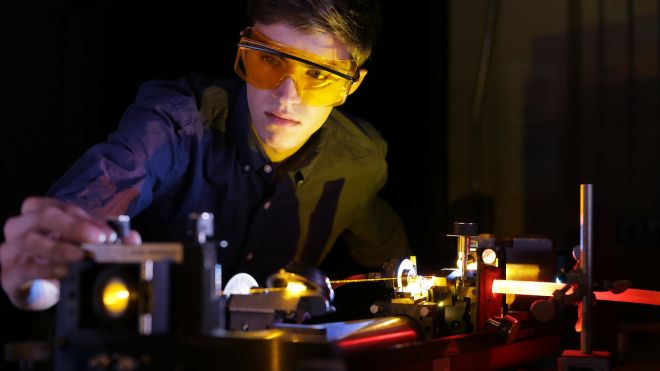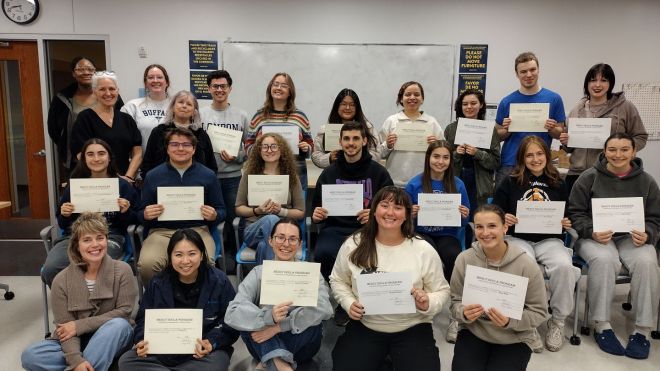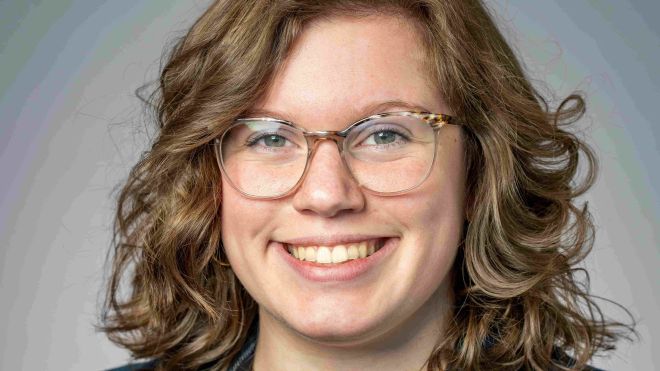Matthew Faulkner ’13 always knew he wanted a college degree from Canisius.
He never anticipated the obstacles he’d encounter along the way.
“As a result, I have a drive and an ambition that I didn’t have before,” says Faulkner. “I have a cause now; a purpose that I want to work towards and achieve.” Faulkner wants to serve as an advocate for young people who have suffered traumatic brain injuries. Despite the dire diagnoses of the condition, “it doesn’t have to mean the end of a person’s independent life.”
Faulkner speaks from first-hand experience.
Four years ago, he suffered a severe brain trauma after a pick-up truck t-boned the Geo Prism in which he was a passenger. When first responders arrived on the scene, Faulkner was unconscious and in cardiac arrest. Mercy Flight transported Faulkner to ECMC, where he underwent emergency surgery to relieve pressure and swelling in his brain.
“The neurosurgeon came to my husband and I in that first week Matthew was in the hospital and said we would likely have to make the unfortunate decision of whether to remove Matthew from life support within the year,” recalls Pamela Faulkner.
Fortunately in this case, the doctor was wrong.
Faulkner remained in a coma in the intensive care unit for more than three weeks. As his condition stabilized, he slowly awoke. Unable to speak, Faulkner communicated with doctors, nurses and his family but pointing to numbers and letters on a poster board.
“That’s when I realized my boy was still ‘in there,’ adds Pamela Faulkner. She recalls asking Faulkner to translate words from English to Spanish and testing his mathematical memory with questions that involved square roots. “We asked the most difficult questions we could think of and he responded correctly every time.”
Faulkner spent 103 days in the hospital. His road to recovery was even longer, and included extensive speech, physical and occupational therapy.
Faulkner’s rehabilitation also delayed his scheduled start at Canisius in fall 2009.
Although the college held his admissions place and the Trustee Scholarship he earned, Faulkner wouldn’t begin his college career at the same time as his high school classmates. Nor would he be able to join his fellow freshmen accepted into the All-College Honors Program. A neuropsychologist added to Faulkner’s frustration when the doctor told him “he likely would never do well in school again.”
The disappointments made Faulkner all the more determined.
“Some people are good at sports. Some are good at music. I was always good in school,” says Faulkner. “That’s what drove me through my recovery. I wanted to continue my education at Canisius and nothing – or no one - was going to get in my way.”
Faulkner earned his bachelor of arts degree in finance in May 2013. He graduated, cum laude, in just three years. Two days after he received his diploma, Faulkner began work as a full-time financial analyst for BidURenergy, Inc., an energy supply consulting firm with industrial, commercial and retail clients.
“Getting into Canisius, earning my degree and finding a job in my field was all part of my original plan and I’m proud to have achieved it, despite a few ‘detours,’” says Faulkner. “But surviving the accident gave me a second chance at life and an ambition to do something that’s bigger than me.”
He’s well on his way.
Faulkner co-authored Most Likely to Survive. The true story starts on the day of Faulkner’s accident and chronicles his lengthy recovery process. He also co-produced “Recovery,” a 90-minute documentary about his experience. Similar to the book, the film reenacts Faulkner’s hospitalization and rehabilitation, and includes interviews with the doctors, therapists, friends, family and clergy members who supported him throughout.
“The idea behind the book and the film is that it provides hope to people that you can move forward – not just from a medical injury but from anything that may be life-altering,” says Faulkner.
His eventual aim is to found a non-profit organization that assists in the care and treatment of the brain injured. Specifically, the organization will help individuals get set up in their new lives so they may regain their quality of life.
“It will be a resource for people who think they can’t overcome their issues because what people sometimes think is impossible, is oftentimes very achievable.”
Faulkner is living proof.



